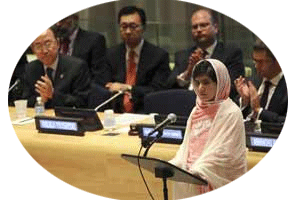 | ||
 |  | |
| Home | About Us | Contact Us |  | Sitemap | Glossary/Sources |
You are here:
CURRENT NEWS / NEW ANNOUNCEMENTS > Malala Yousafzai invokes Mahatma Gandhi in her UN speech
Malala Yousafzai invokes Mahatma Gandhi in her UN speech

Pakistani teen activist Malala Yousafzai, in her first public speech at the United Nations since being shot in the head by the Taliban, has said she is inspired by Mahatma Gandhi's path of non-violence.
Malala invoked Gandhi and other global advocates of non-violence stressing that, "I'm not against anyone, neither am I here to speak in terms of personal revenge against the Taliban, or any other terrorist group." "I'm here to speak about the right of education for every child," Malala said, in an impassioned address to the UN Youth Assembly on Friday. "I want education for the sons and daughters of all the Taliban and all the terrorists and extremists. I do not even hate the Talib who shot me. Even if there is a gun in my hands and he stands in front of me, I would not shoot him." "This is the philosophy of non-violence that I have learnt from Gandhiji, Badshah Khan and Mother Teresa," the 16-year-old said. Malala told the UN that she would not be silenced by terrorist threats. "Let us pick up our books and our pens. They are our most powerful weapons. One teacher, one book, one pen, can change the world," Malala said. The UN celebrated the Pakistani schoolgirl's 16th birthday on Friday as Malala Day with day-long programmes for youth, drawn from all over the world. Malala became a global icon for girls' education after being brutally attacked by Taliban militants while on her way to school in Swat valley on October 9, 2012. Malala told the gathering that the Taliban's attack nine months ago changed nothing in her life. “They shot my friends too. They thought that the bullets would silence us and change our aims and stop our ambitions but nothing changed in my life except this: weakness, fear and hopelessness died. Strength, power and courage were born. I am the same Malala. My ambitions are the same. My hopes are the same. My dreams are the same," the rights activist said. Telling the Assembly that she was focusing on women's rights and girls' education because they were suffering the most, she called upon world leaders to change their strategic policies in favour of peace and prosperity. "We call upon all governments to ensure free compulsory education for every child all over the world," she said, also calling on governments to fight against terrorism and violence, to protect children from brutality and harm. "The extremists were, and they are, afraid of books and pens," Malala said. "The power of education frightens them. They are afraid of women," she said. Malala called for worldwide action against illiteracy, poverty and terrorism. The meeting, which featured nearly 1,000 youth leaders, was addressed by former United Kingdom Prime Minister Gordon Brown, in his capacity as UN Special Envoy for Global Education, Vuk Jeremic, President of the General Assembly, and Ahmad Alhendawi, the Special Envoy on Youth. Opening the proceedings, Brown told the Youth Assembly: "You cannot say there is anything other than an education emergency that we need to solve." With that in mind, he hailed young people as "the new superpower in the world" with the capability to overcome all obstacles to access education. On June 17, Brown launched a worldwide petition calling for urgent action to ensure the right of every child to safely to attend school. Malala was the first signatory and since then, more than one million people have signed the petition. |